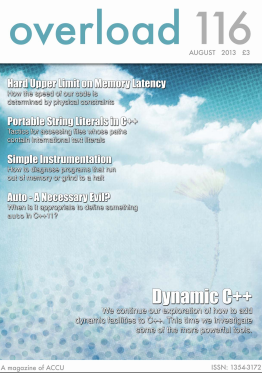C++: Polymorphic Cloning and the CRTP (Curiously Recurring Template Pattern)--Katy Coe
 On CRTP with multi-level inheritance, cloning, and the constructor forwarding problem.
On CRTP with multi-level inheritance, cloning, and the constructor forwarding problem.
C++: Polymorphic cloning and the CRTP (Curiously Recurring Template Pattern)
by Katy Coe
From the article:
A common problem in C++ occurs when you have an object of an unknown derived type and want to make a copy of it. ...
The solution is to use the commonly-used polymorphic cloning pattern. In this pattern, we define a virtual function -- which we’ll call
clone()in this article -- which when called via an object pointer returns a new object of the correct derived type.

 Today on Dr. Dobb's:
Today on Dr. Dobb's: A slight change from C++98 to C++11, tightening up destructor semantics. Yes, it's still considered a best practice to never allow an exception to escape from a destructor -- in any language with destructor or
A slight change from C++98 to C++11, tightening up destructor semantics. Yes, it's still considered a best practice to never allow an exception to escape from a destructor -- in any language with destructor or  A look at resumable functions:
A look at resumable functions: A nice comparison on converting a string to int:
A nice comparison on converting a string to int: